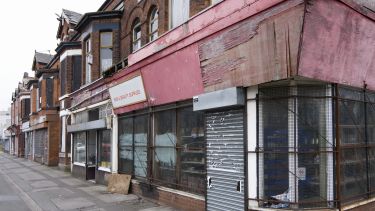- The shift to home working during Covid-19, or ‘Zoomshock’, threatens the survival of local goods and services provided in city centres and business parks
- The long-term migration of economic activity away from business areas as working from home becomes the new normal, may have consequences for the future of our towns and cities
- Research can help local authorities take a place-based approach for recovery policies for the business sector
The Covid-19 pandemic has not only drastically changed how we live, but also how we work, and this could have long term consequences for the future of our cities, say academics from the University of ∫˘¬´”∞“µ.
Research published yesterday (13 January 2020) in , has found that as more of us continue to work from home, the flow of people from their high-density urban areas like city centres, out into the low-density residential suburbs, could have dramatic longer term effects on the provision of goods and services.
Commuting from the suburbs to work means most people also access locally consumed services (LCS) that are based around the same area, such as buying lunches and coffees from a local cafe, going to the gym during a lunch break, the post office, or even shopping on the high street.
, looks at what effect the numbers of people now working from home is having on the demand and future provision for these LCS in our towns and cities, potentially changing the way they look forever.
Dr Jesse Matheson, from the Department of Economics at the University of ∫˘¬´”∞“µ said: ‚ÄúAs the pandemic continues for longer than we ever expected, we are becoming used to images of almost deserted highstreets on the news, reflecting the decreased demand from consumers in these traditional work hubs. In contrast, the same kinds of services in residential areas are now struggling with an unprecedented rise in demand, with some areas even seeing new businesses opening during the pandemic.
“Understanding this substantial geographic shift in economic activity across our neighbourhoods, the Zoomshock as we call it, gives us the data to target where local businesses are affected and which are likely to struggle to survive the ongoing public health crisis.”
Integrating this research into policy will help local authorities support businesses and services to weather the storm and recover from the Covid-19 pandemic. This could also mean providing for areas which lack essential services in the future by assisting the relocation of LCS, or even re-envisioning how the space in our city centres could be used differently.
Dr Matheson said: “We could potentially be looking at a future where our city centres and business parks may not see the same level of people returning, so it stands to reason that some businesses traditionally relying on a commuting workforce may be unable to survive.
“However we can’t let all businesses and services fail in urban areas, so the data we have collected will be able to help local authorities plan for the future of their urban spaces dedicated to business, and take a place-based approach in the creation of recovery funds and assistance for areas of concern.”
As centrally pooling the provision of local goods and services is the most efficient way to provide access, Dr Matheson thinks that in the long term our towns and cities will eventually entice businesses and services back onto the high street and into business parks; but it still may be years ahead of us that the high street looks as bustling and alive as it once did.
Notes to editors
Read the full paper at



